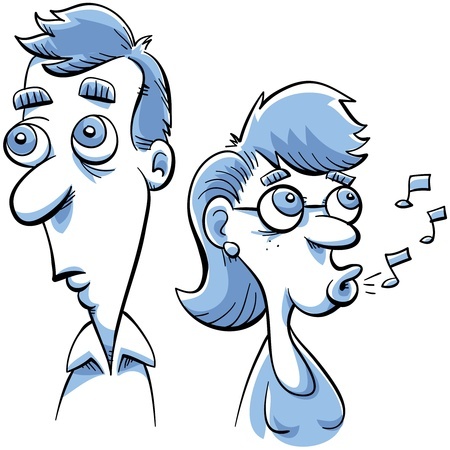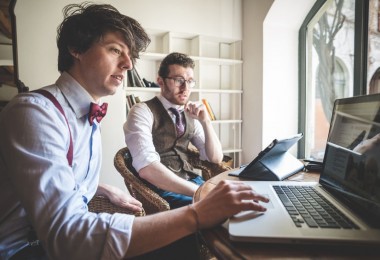Most people can’t define what makes someone socially awkward, weird or socially inept. But they can usually recognize it instantly. In other words, you know one when you see one.
However, what can be harder is analyzing yourself to figure out: “Am I socially awkward?”
That’s why I’ve written this article showing you 10 sure signs to watch out for. Then at the end you’ll learn what advice truly works (and what doesn’t) to overcome this problem.
By the way, even if you score a perfect 10/10, please don’t dig a hole in the ground to live in yet! You are not alone and there is plenty of hope for you!
The reason why I know all these signs so well is because I used to be the most socially awkward guy in the world. Now not only are my own social skills above average (heck, I have my own Youtube channel), but I’ve also helped thousands of people over the internet, and I can help you too.
10 Signs To Know If You Are Socially Awkward
- Feeling nervous, uncomfortable or weird in social situations. How you feel on the inside usually comes out on the outside. They say the feeling of enthusiasm is contagious, well so is the feeling of awkwardness.
- Trying hard to avoid breaking all the social rules. Oh, and you don’t really know what most of them are, so you’d better be extra careful. Was there a class in school called Social Skills 101 that you missed out on?
- Feeling self conscious of every little thing you do. This goes together with the whole idea of not wanting to break any social rules. Will people see you standing there alone? Did you dress too fancy for this party? Too casual?
- Not knowing the ‘right’ thing to say. Funny how you’re never at a loss for words when you talk to your closest friend. You only run out of things to say in uncomfortable situations like meeting new people or talking to someone you like.
- Being hesitant and timid. You hold yourself back from saying the comment that popped into your mind, or going to talk to that person. You wonder if it’s the right moment. Then you’ve waited too long and it’s too late. The conversation has moved on, or the person went to the bathroom.
- Bad conversational flow. When you do talk, your thoughts stumble out of your mouth sounding confused and disorganized.
- Saying or doing the wrong thing at the wrong time. Also known as putting your foot in your mouth, which Urban Dictionary defines as: “When one accidentally says something offensive or stupid.”
- When you say things people often ignore your comment or look at you funny. Worse, they roll their eyes at each other. When you’re socially awkward people may start treating you like a child, and not taking you seriously. They may even avoid you altogether and run off to talk to the confident popular people.
- You just know you’re doing something wrong to turn people off in social situations. The problem is you don’t know exactly what it is, or how to fix it! And last, but not least…
- Constantly replaying that embarrassing moment or awkward silence in your head. As if burning the mistake into your memory is going to stop it from happening in the future.
Well that about sums it up. The more of these traits you have, the more socially awkward you are. (If you know any more big signs let me know in the comments below.)
What Advice DOESN’T Work For Social Awkwardness?
Before I get to my tips, first I need to quickly point out some very common advice you’ll read in articles online that basically never works. Usually this is advice written by people who have never actually struggled with poor conversation skills, low social confidence or a lack of friends. They’re just writing an article to make a few bucks on the side, without actually knowing what they’re talking about.
1. “Everybody Feels Awkward Sometimes!”

How I feel about most “social skills advice.”
Similar to telling an obese person that “everyone overeats sometimes, even supermodels”… this doesn’t actually solve the problem of being awkward.
People who are only a bit awkward sometimes would NOT be reading an article like this one about it anyway. It’s people who are often very awkward and find it painful that seek out advice.
2. “People Aren’t Looking At You Anyways Silly!”
This advice really grinds my gears. The problem is that it sounds like it should help a socially awkward person, but in reality it doesn’t. Yes, it’s true that believing that other people are watching and judging you is part of your problem. But that doesn’t mean directly telling you to “just stop it” is gonna fix it.
It’s like telling a fat person to “just put down the fork dummy.” Without giving them any advice about overcoming an emotional addiction to eating, changing old habits or good nutrition.
So What Advice Does Work?
Okay, so now let’s get to the tips that can actually help you become less socially awkward.
1. “Tune” Your Social Skills
 Have you ever heard someone play a guitar that was out of tune? It ain’t fun to listen to. An out-of-tune guitar can grate like nails on a chalkboard, so it’s important to adjust the strings regularly.
Have you ever heard someone play a guitar that was out of tune? It ain’t fun to listen to. An out-of-tune guitar can grate like nails on a chalkboard, so it’s important to adjust the strings regularly.
If a guitar isn’t tuned properly, then the guitar player can try all he wants to hit the right strings, but what actually comes out will always sound strange and weird.
This applies to your social skills as well.
Does it ever feel like you are trying hard to say the right thing but what you are saying is “off”? Maybe you tell a joke and nobody finds it funny. Or you make a comment that just doesn’t fit into the conversation so people ignore it.
The solution is to tune your social skills. Unfortunately, there is no shortcut here. You do this by simply talking to people more often. The best way to stop being weird is to push through the weirdness until you aren’t weird any more. (Try saying that ten times fast.)
I know this first tip is a bit obvious but so many people forget this foundation while they are looking for a “magic shortcut” to social skills.
The people who are the least “weird” and socially awkward are simply the ones who spend the most time talking to people. Think of the coolest, most outgoing person you’ve ever seen. Chances are, they spend hours a day talking to people.When you spend a lot of time talking to people, you start to develop a feeling or intuition of what you should say next. You don’t even have to think about it, because you’ve done it for so long. The words just pop out of your mouth.
It’s like your first time playing a new video game or learning how to type. At first you felt awkward and slow doing it, but over time you become able to play automatically. It’s like your fingers move themselves. Muscle memory. This is how really social people talk. Their mouths move themselves based on the feelings they have in their body. That’s why they don’t have to think ahead to what they are going to say next in casual conversations, they just talk spontaneously.
Make sure you get out of the house regularly. Even a ‘normal’ person would probably feel a bit awkward stepping into a social situation if they’ve spent all day on the computer. If you are an introvert then you’ll need to make even more effort to be outgoing since you’re naturally comfortable being alone a lot.
You can also ‘tune’ your mind quickly by ‘warming up’ before challenging social situations. What do I mean? If you have to go to a party, date or interview later today, then do something simple beforehand like asking a couple strangers for directions to get your mind into more of a social flow.
And the second step to stop coming across as weird is to…
2. Treat People As Mirrors (aka Improve Your Own Self Esteem & Confidence)
 The more I’ve overcome my own social anxiety, the more I’ve come to realize that people are basically mirrors. They are reflections of you. Let me explain…
The more I’ve overcome my own social anxiety, the more I’ve come to realize that people are basically mirrors. They are reflections of you. Let me explain…
Back when I always felt really anxious and tense around people, I found that they always became more cautious and defensive around me. This caused me to tense up even more because I felt rejected. It was a vicious cycle that made it difficult to get any close friends.
On the other hand, when I started to become more relaxed and comfortable around people internally, they opened up as well.
People are mirrors. However you feel inside will be reflected back to you in how other people treat you.
This is why it’s so important to learn practical techniques for lowering your social anxiety when around people. If you’re feeling anxious, nervous, tense, insecure, depressed and sad inside while you’re talking to someone, they will feel it. They will actually feel your insecurity coming off of you and become repelled by it.
In fact, science has proved that people actually have “mirror neurons” in their brains that help them connect and relate to other people. This means that when you talk to someone, they will start to feel how you feel. And if you feel negative and insecure about yourself, the other person will often feel like running away without them even knowing why. (Probably why people never ever came up to me in school to start conversations.)
You can’t feel bad inside and hope to “cover it up” somehow. You actually have to feel relaxed and at ease on the inside if you want to give off a good vibe. If you try to act happy and confident on the outside when you feel shitty, then people will sense that you’re putting on a false front, and this will make them think you’re weird.
3. Radiate Warmth and Positive Emotions
So if people are a mirror to you, then how can you change yourself? How can you change the emotions you feel inside so that other people aren’t automatically turned off? How can you actually stop feeling weird, uncomfortable, insecure, etc?
Well, I’m not a fan of so-called positive thinking and science has proven that affirmations are mostly bullshit. (See #4 in this article.) However there are some proven ways you can improve your overall mood even if you do often feel bad about yourself now.
I’ve recorded a video that goes into the detailed steps here:
To Make Anyone Like You, Do This
4. It’s Not What You Did That Matters, It’s How You Dealt With It
Everybody has awkward moments where they think:
- “Did I really just say that?”
- “Shit, nobody laughed at my joke.”
- “Oh god I don’t know what to say next. I need to fill this silence somehow!”
 The difference between socially awkward and socially confident people is NOT an absence of awkward moments. It’s just that the confident people do not call attention to the socially awkward moment either externally or internally, which allows it to pass and be forgotten quickly.
The difference between socially awkward and socially confident people is NOT an absence of awkward moments. It’s just that the confident people do not call attention to the socially awkward moment either externally or internally, which allows it to pass and be forgotten quickly.
This means you need to stop the habit of dwelling on an awkward thing you may have said. Whether it happened 10 seconds, 10 days, 10 months or 10 years ago… the past is the past. There’s no way to change it. Life flows on.
The fact is, other people actually aren’t sitting around right now steaming about that time you accidentally insulted their country or their mother… well probably not.
5. Learn To Apologize and Empathize When You Make A Social Mistake
Socially awkward people are very careful to not violate any invisible social rules. We don’t really know what these rules are, but I think we believe that once we break a rule or say the wrong thing, we’re screwed. People won’t ever like us. Future job interviewers will laugh in our faces. We’ll all die virgins. And so on.
Nothing could be further from the truth.
Paradoxically, being overly hesitant, timid and careful not to offend people is what makes you awkward and turns people off. So here’s how to fix this problem…
What do people do when they make a social mistake? They apologize and empathize. If you say something weird or offensive to someone you are not yet doomed. Just say “Oh sorry, that didn’t come out the way I intended!” and then change the subject to something else.
With experience you’ll learn that you can handle making the occasional mistake or faux pas. Which will give you more confidence. You’ll feel less scared about embarrassing yourself by saying something too boring, dumb or offensive. Which will make you speak up more easily and more often. This doesn’t happen overnight — it’s a learning process.
6. Allow Yourself To Be Imperfect
 If you are a guy that feels too scared of rejection to strike up a few conversations with cute girls walking down the street, in a bar or wherever, then here’s an interesting exercise I recommend:
If you are a guy that feels too scared of rejection to strike up a few conversations with cute girls walking down the street, in a bar or wherever, then here’s an interesting exercise I recommend:
Instead of trying to “do well”… see how badly you can mess up. See how socially awkward of a situation you can get into. Give yourself the challenge to embarrass yourself as spectacularly as possible.
I’ve done this exercise myself countless times, and so have many of my students. You know what happens? When someone no longer feels the pressure to “perform well” and is given permission to be awkward and embarrassed and then laugh about it… they actually do much better.
I’ve seen guys who used to be frozen in place at even the thought of talking to a cute girl, now walk over to her easily. Guys who could only say “Hi” to a girl in a shy and timid way now approach them with more boldness and confidence. Because they’re okay with looking bad. They don’t have to be so careful anymore.
Funny how that works, huh?
Conclusion
If you follow these 6 steps, you will be well on your way to becoming a LOT less socially awkward. It’s not an overnight transformation, but trust me… it’s worth it. You’ll be able to keep conversations going better, you’ll feel less scared before going into big groups of people, and best of all you’ll feel free to be YOU when you talk with people.
Leading to more connections. More friendships. More self esteem.
You’re not alone in this.
I know you can do it.
P.S. If you want to read something funny, check this out: Anxiety Ridden Man Rightly Ashamed of Every Single Thing He Does






Good Idea! I’m gonna stop being so different and start being like everyone else! 😀 lol
I would say don`t try to be like others or everyone else as you quoted but try to be you. You are the best option to make you uniquely unique. Do yourself a favor by updating yourself daily and be open to ideas that can improve yours. Just like bat man, he took a ferrari and turned it into the bat mobil. See yourself different but with the ability to understand other and relate fluently.
I think it’s funny you write an article with a guitar as a metaphor for social anxiety.
I feel my voice, what I say and how I say it, always comes out wrong, as if I’m not in sync with myself.
Then I have been thinking for a long time on how to explain a therapist about my problem, for the few treatments I’ve been to where I’ve tried to explain ‘I think it is my voice that is the problem’, and that I often focused on how I was talking, it was as if they did not really understand my problem.
I often model the people I think are socially skilled, to the point that I actually do not know how I speak as a person, I copy quite often other I stand and talk to who I think has more value socially than I have
Where I actually, to some extent duplicate what they say and how they say it and it frustrates the hell out of me that I don’t have my own way to talk in a way where I also rests 100% in myself.
But maybe i just have to keep feeling awkward and weird until it will change, but i just think i have done that for so long, i always try to ACT confidently, but that is just something that gets me through the day, and it is not permanently.
The way I was going to explain to a therapist about my problem was to use a piano as a metaphor that if a piano is out of tune you can hear it very easily
And I feel I’m like a piano that is out of tune, I can just feel there is something that does not match
I have never read about someone using the same example, so i think it was pretty fun that you are using it.
I have also bougt your book, im in the process of going through it a second time on my kindle, and then cross all of that I can use here and now.
Thank you for your honesty and some really great posts!.
I feel the same way about my voice and all u said…..resonated with me on a deep level
@mikhael
Thanks for the comment, glad you connected with the guitar example!
Hi Mikhael,
Have you thought about working with a speech coach, or a Gestalt therapist? Both can help you with voice problems linked to anxiety.
Gestalt therapy is body-mind psychotherapy, and can be more affordable than working with a registered psychologist (my Gestalt is AUD$100/hr).
Then there’s the option of a voice coach. I originally met with a voice coach as a once-off when I was promoted at work, and had new responsibilities to do public speaking. But I learned so much more than work skills! She gave me lots of individual feedback, and practical exercises I can do at home to improve my voice. I’ve met with her just twice and seen many benefits – she costs AUD$150/hr.
If you struggle to feel comfortable in your own skin, explore codependency, inner child work, John Bradshaw’s Homecoming TV series, etc. CoDA is free, and there are phone/online/real meetings worldwide.
Cheers and good luck Mikhael!
I’m looking at this with perspective of aim to acquire: resources, territory and allianse to reproduce and acquire even more resources and territory. These aims are the same for every life being even plants :). Communication generally is a way to create alliance. Awkward situation happens when there are no aims of conversation.
Sean,
You cannot have been the most socially awkward person in the world, because that is me!
Haha I’m sure many people reading this probably feel like they’re the worst. 🙂
I also fell like this ” I am the most awkward person ” but now I noticed that every one thought like this because their thoughts has the mistake….think positive ….now I compare with other people who has more awkward than me…..
This is THE best article from whatever I’ve read about social anxiety and provides a clear picture on how to overcome this. Great work.
Sean I have been recently reading alot of material you write. And it has started making an effect on my socially decrepit life. Thank you for all you write. I still havent found time to watch the entire water bottle trick video.
I feel like my worst symptom is feeling invisible eyes on me and judging judging, so i hope to study more on that symptom specifically.
Hey Sean,
There’s some good advice here thanks for posting. I’m currently recovering from my social anxiety and the more tips and advice I hear the better.
I guess my only comment on the article would be that just because someone happens to be awkward as a result of their anxiety, it does no make them unlikeable or ‘weird’ in fact some people may view it as an endearing/human trait. I think once your a nice person, despite your anxiety, people will still like you.
Also when someone is doing their level best to overcome their SA the last thing they need is to be more self conscious so when you say “If you’re feeling anxious, nervous, tense, insecure, depressed and sad inside while you’re talking to someone, they will feel it. They will actually feel your insecurity coming off of you and become repelled by it” this isn’t very helpful. Infact it has the potential to exacerbate the problem for some people. While some people might be very perceptive to your anxiety many others are not. Most people I talk to see me as outgoing/confident (or so in told) so clearly my anxiety isn’t very noticeable.
Regards
Mark
I constantly make people uncomfortable, always communicate in effectively or seem rude to people all because of my own anxiety. I doubt I will ever get better though. I keep trying but I feel so unstable like I’m going crazy. There is only so much one person can hold on to until they crumble under the weight.
This is such a great article. I’m still socially shy and anxious. Years before I tried to overcome this behaviour not until a loser in my previous work passively harassed me (what a shameless person because he’s known by other people as professional because he’s a physical therapist). I tried to followed some of coemployees’ advises to ignore him but doesn’t work. He kept trying to put me down in a unnoticeable ways. When I confronted him he simply denied things and makes me looks crazy. Not until I blew off and my boss found out. Thankfully my boss believed in me because she sees the lies by looking at my harasser’s behaviour despite of his denials the time she spoke to us regarding the fight. After this, he stopped but of course he kept giving me a nasty looks which is not bad for me. Right now, I’m have my own wonderful family and I’m still shy and anxious when dealing with my in-laws except towards my mother-in-laws and some of her friends who are genuinely nice to me. My other in-laws like my husband’s brothers and their wives whenever I tried to engaged a conversations with them, they quickly started looked each other that something wrong what I’ve said. I’m easily discouraged when people find me weird even to what I said. I’m so lucky that I married to a wonderful and compassionate man and who’s very open-minded. Not only towards me but to other people. Right now what I do is just picked who should I comfortably to talk with. I tried not to talk to someone who just let me down and two faced. If this kind of people asked me, I answer them but not a conversation.
Oh my..
Cool, Mostly true, relatable and umm.. “Oh god I don’t know what to say next. I need to fill this silence somehow!”.. (yup, that’s sooo me)
Amazing piece°
I currently study in a different state … I have good friends in my hometown but here It feels difficult to connect with these people . I am shy but I can get comfortable with people once they talk to me but here I feel isolated and lonely
And maybe that’s because of my social awkwardness…, you gave great advices , I’ll implement them now
Just discovered your website, and I’ve read a few articles now. A lot of it is reinforcement of concepts we’ve all heard before (not a bad thing), but I’ve found at least one mind-blowing insight in every post! Thanks for sharing, Sean.
I honestly loved this. I’m reading this as I’m awake at 3am overthinking but now I realize I am on the right track to becoming emotionally sound:) thanks
On the button. I appreciate reading advice from someone who knows what it feels like to be awkward. You analyze it in a way that makes sense to someone in the same boat instead of some generic “be positive and get out there!” – easier said that done. Cheers.